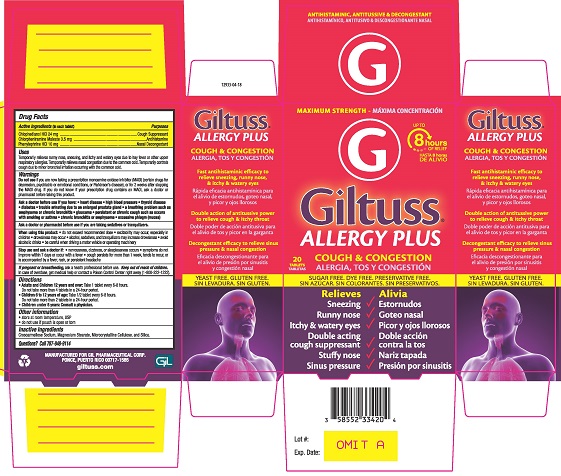Giltuss Allergy Plus | Chlophedianol Hcl, Chlorpheniramine Maleate, Phenylephrine Hcl Tablet while Breastfeeding

What is Giltuss Allergy Plus | Chlophedianol Hcl, Chlorpheniramine Maleate, Phenylephrine Hcl Tablet ?
Brief: Cough Suppressant Antihistamine Nasal Decongestant
Can I use Giltuss Allergy Plus | Chlophedianol Hcl, Chlorpheniramine Maleate, Phenylephrine Hcl Tablet while breastfeeding?
Giltuss Allergy Plus | Chlophedianol Hcl, Chlorpheniramine Maleate, Phenylephrine Hcl Tablet Breastfeeding Analsys
Phenylephrine hydrochloride while Breastfeeding
Low RiskCAS Number: 59-42-7
Used on topical decongestant solutions for nose drops at low concentration. 10% midriatic eye drops are available. Because low concentration is used on nose and ophtalmic drops a significant excretion into breast milk is unlikely. Low oral biodisponibility minimizes any risk of harmful effect in the infant. Authorized for nasal or ophtalmic use on children aged younger than 1 year. Although on latest update relevant data on breastfeeding was not found it is considered to be safe when minimal dose is used. Avoid excessive or long term use. A related drug Pseudoephedrine can inhibit milk production. It would be advisable to press on the lachrimal sac to minimize absorption.
Chlorpheniramine maleate while Breastfeeding
Low RiskCAS Number: 132-22-9
First generation antihistaminic and alchylamine drug, with sedative effect. Its active isomer is Dexchlorfeniramine. Likely inhibition of lactation within the first weeks post delivery because anti-prolactin effect.. Short-term and low dose (2 mg one or twice-day) treatment is compatible with breastfeeding. Be aware of somnolence in the child. For long-term treatment an alternative drug should be preferred. Compounds in association with expectorants, corticoids and cough relief medicines are available. Avoid drug associations especially while breastfeeding. Follow-up for sedation and feeding ability of the infant. Bed-sharing is not recommended for mothers who are taking this medication.
Giltuss Allergy Plus | Chlophedianol Hcl, Chlorpheniramine Maleate, Phenylephrine Hcl Tablet Breastfeeding Analsys - 2
Phenylephrine hydrochloride while Breastfeeding
CAS Number: 59-42-7
The oral bioavailability of phenylephrine is only about 40%,[1] so the drug is unlikely to reach the infant in large amounts. However, intravenous or oral administration of phenylephrine might decrease milk production. Because no information is available on the use of oral phenylephrine during breastfeeding, an alternate drug may be preferred, especially while nursing a newborn or preterm infant.Phenylephrine nasal spray or ophthalmic drops are less likely to decrease lactation. To substantially diminish the effect of the drug after using eye drops, place pressure over the tear duct by the corner of the eye for 1 minute or more, then remove the excess solution with an absorbent tissue.
Chlorpheniramine maleate while Breastfeeding
CAS Number: 132-22-9
Small (2 to 4 mg), occasional doses of chlorpheniramine are acceptable during breastfeeding. Larger doses or more prolonged use might cause effects in the infant or decrease the milk supply, particularly in combination with a sympathomimetic such as spseudoephedrine or before lactation is well established. Single bedtime doses after the last feeding of the day may be adequate for many women and will minimize any effects of the drug. The nonsedating antihistamines are preferred alternatives, though.
What should I do if already breastfed my kid after using Giltuss Allergy Plus | Chlophedianol Hcl, Chlorpheniramine Maleate, Phenylephrine Hcl Tablet?
Not much study has been done on safety of Giltuss Allergy Plus | Chlophedianol Hcl, Chlorpheniramine Maleate, Phenylephrine Hcl Tablet in breastfeeding and its ingredients. Even we do not have complete information about usage of Giltuss Allergy Plus | Chlophedianol Hcl, Chlorpheniramine Maleate, Phenylephrine Hcl Tablet in breastfeeding so at this point a trained medical professional could be your best bet. If you observe anything abnormal with your baby please contact 911.
My doctor has prescribed me Giltuss Allergy Plus | Chlophedianol Hcl, Chlorpheniramine Maleate, Phenylephrine Hcl Tablet, what should I do?
If your doctor considers Giltuss Allergy Plus | Chlophedianol Hcl, Chlorpheniramine Maleate, Phenylephrine Hcl Tablet safe enough to prescribe for you that means its benefits should outweigh its known risks for you.
If I am using Giltuss Allergy Plus | Chlophedianol Hcl, Chlorpheniramine Maleate, Phenylephrine Hcl Tablet, will my baby need extra monitoring?
We are not Sure, Please check with your healthcare provider or doctor.
Who can I talk to if I have questions about usage of Giltuss Allergy Plus | Chlophedianol Hcl, Chlorpheniramine Maleate, Phenylephrine Hcl Tablet in breastfeeding?
US
National Womens Health and Breastfeeding Helpline: 800-994-9662 (TDD 888-220-5446) 9 a.m. and 6 p.m. ET, Monday through Friday
UK
National Breastfeeding Helpline: 0300-100-0212 9.30am to 9.30pm, daily
Association of Breastfeeding Mothers: 0300-330-5453
La Leche League: 0345-120-2918
The Breastfeeding Network supporter line in Bengali and Sylheti: 0300-456-2421
National Childbirth Trust (NCT): 0300-330-0700
Australia
National Breastfeeding Helpline: 1800-686-268 24 hours a day, 7 days a week
Canada
Telehealth Ontario for breastfeeding: 1-866-797-0000 24 hours a day, 7 days a week
